The Social Responsibility of Business: Maximizing Profits and Ethics
VerifiedAdded on 2023/01/06
|8
|2238
|63
Essay
AI Summary
This essay explores the central argument that the social responsibility of business is to increase its profits, examining various theories and their implications. It begins by defining social responsibility and its ethical dimensions, then delves into the Friedman doctrine, which prioritizes shareholder value and profit maximization. The essay discusses the doctrine's normative aspects, critiques, and its impact on corporate behavior. It then contrasts this with the concept of Corporate Social Responsibility (CSR), highlighting its focus on ethical practices and stakeholder engagement. The essay uses examples like Tesco and ASDA to illustrate how CSR initiatives can enhance profitability and brand image. It concludes that while shareholder value is important, a broader approach to social responsibility, encompassing ethical considerations and community engagement, is essential for long-term business success and profit generation. The essay emphasizes the importance of balancing profit with social and environmental responsibilities for sustainable growth.

The social
responsibility of
business is to increase
its profits
responsibility of
business is to increase
its profits
Paraphrase This Document
Need a fresh take? Get an instant paraphrase of this document with our AI Paraphraser

Table of Contents
INTRODUCTION ..........................................................................................................................3
MAIN BODY ..................................................................................................................................3
CONCLUSION ...............................................................................................................................6
REFERENCES ...............................................................................................................................8
INTRODUCTION ..........................................................................................................................3
MAIN BODY ..................................................................................................................................3
CONCLUSION ...............................................................................................................................6
REFERENCES ...............................................................................................................................8
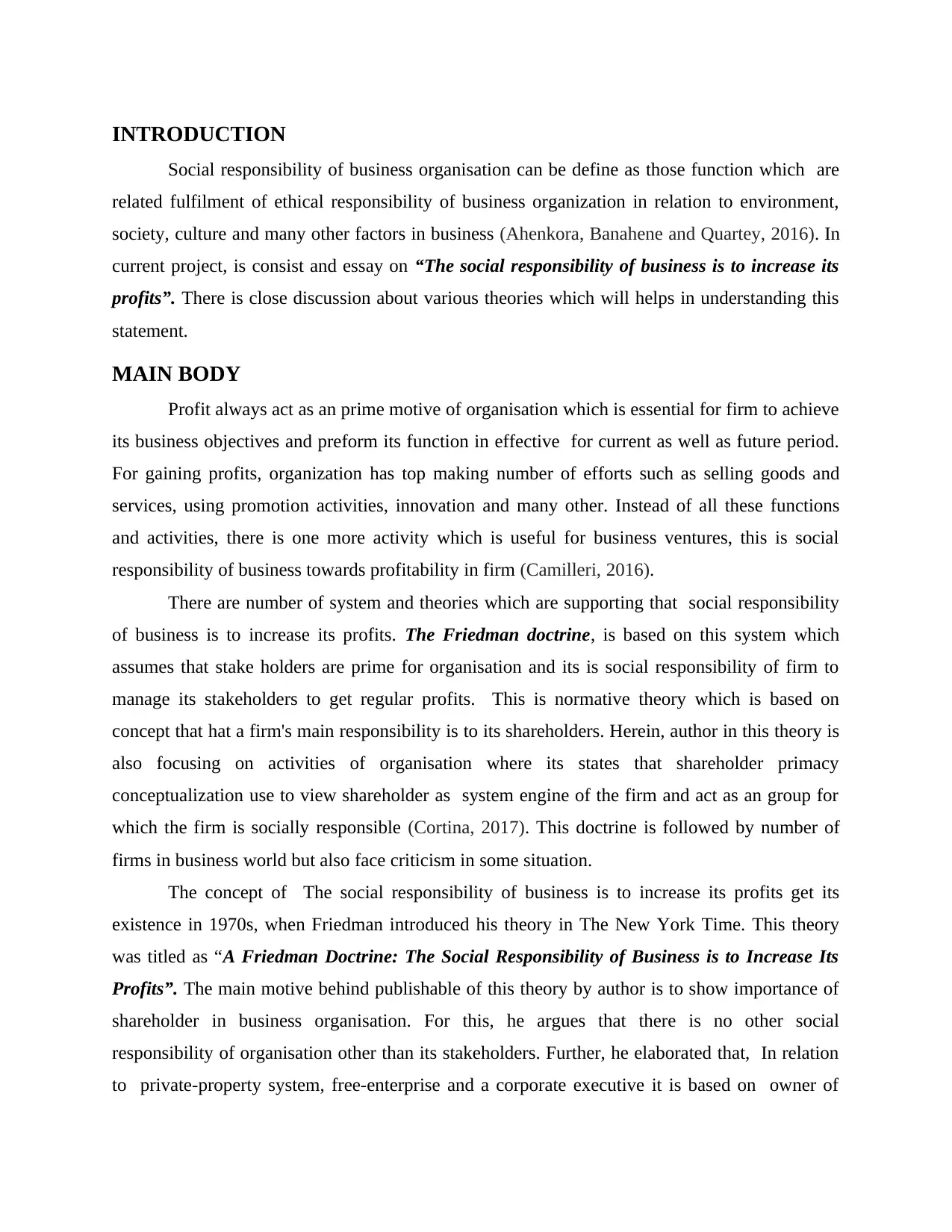
INTRODUCTION
Social responsibility of business organisation can be define as those function which are
related fulfilment of ethical responsibility of business organization in relation to environment,
society, culture and many other factors in business (Ahenkora, Banahene and Quartey, 2016). In
current project, is consist and essay on “The social responsibility of business is to increase its
profits”. There is close discussion about various theories which will helps in understanding this
statement.
MAIN BODY
Profit always act as an prime motive of organisation which is essential for firm to achieve
its business objectives and preform its function in effective for current as well as future period.
For gaining profits, organization has top making number of efforts such as selling goods and
services, using promotion activities, innovation and many other. Instead of all these functions
and activities, there is one more activity which is useful for business ventures, this is social
responsibility of business towards profitability in firm (Camilleri, 2016).
There are number of system and theories which are supporting that social responsibility
of business is to increase its profits. The Friedman doctrine, is based on this system which
assumes that stake holders are prime for organisation and its is social responsibility of firm to
manage its stakeholders to get regular profits. This is normative theory which is based on
concept that hat a firm's main responsibility is to its shareholders. Herein, author in this theory is
also focusing on activities of organisation where its states that shareholder primacy
conceptualization use to view shareholder as system engine of the firm and act as an group for
which the firm is socially responsible (Cortina, 2017). This doctrine is followed by number of
firms in business world but also face criticism in some situation.
The concept of The social responsibility of business is to increase its profits get its
existence in 1970s, when Friedman introduced his theory in The New York Time. This theory
was titled as “A Friedman Doctrine: The Social Responsibility of Business is to Increase Its
Profits”. The main motive behind publishable of this theory by author is to show importance of
shareholder in business organisation. For this, he argues that there is no other social
responsibility of organisation other than its stakeholders. Further, he elaborated that, In relation
to private-property system, free-enterprise and a corporate executive it is based on owner of
Social responsibility of business organisation can be define as those function which are
related fulfilment of ethical responsibility of business organization in relation to environment,
society, culture and many other factors in business (Ahenkora, Banahene and Quartey, 2016). In
current project, is consist and essay on “The social responsibility of business is to increase its
profits”. There is close discussion about various theories which will helps in understanding this
statement.
MAIN BODY
Profit always act as an prime motive of organisation which is essential for firm to achieve
its business objectives and preform its function in effective for current as well as future period.
For gaining profits, organization has top making number of efforts such as selling goods and
services, using promotion activities, innovation and many other. Instead of all these functions
and activities, there is one more activity which is useful for business ventures, this is social
responsibility of business towards profitability in firm (Camilleri, 2016).
There are number of system and theories which are supporting that social responsibility
of business is to increase its profits. The Friedman doctrine, is based on this system which
assumes that stake holders are prime for organisation and its is social responsibility of firm to
manage its stakeholders to get regular profits. This is normative theory which is based on
concept that hat a firm's main responsibility is to its shareholders. Herein, author in this theory is
also focusing on activities of organisation where its states that shareholder primacy
conceptualization use to view shareholder as system engine of the firm and act as an group for
which the firm is socially responsible (Cortina, 2017). This doctrine is followed by number of
firms in business world but also face criticism in some situation.
The concept of The social responsibility of business is to increase its profits get its
existence in 1970s, when Friedman introduced his theory in The New York Time. This theory
was titled as “A Friedman Doctrine: The Social Responsibility of Business is to Increase Its
Profits”. The main motive behind publishable of this theory by author is to show importance of
shareholder in business organisation. For this, he argues that there is no other social
responsibility of organisation other than its stakeholders. Further, he elaborated that, In relation
to private-property system, free-enterprise and a corporate executive it is based on owner of
⊘ This is a preview!⊘
Do you want full access?
Subscribe today to unlock all pages.

Trusted by 1+ million students worldwide
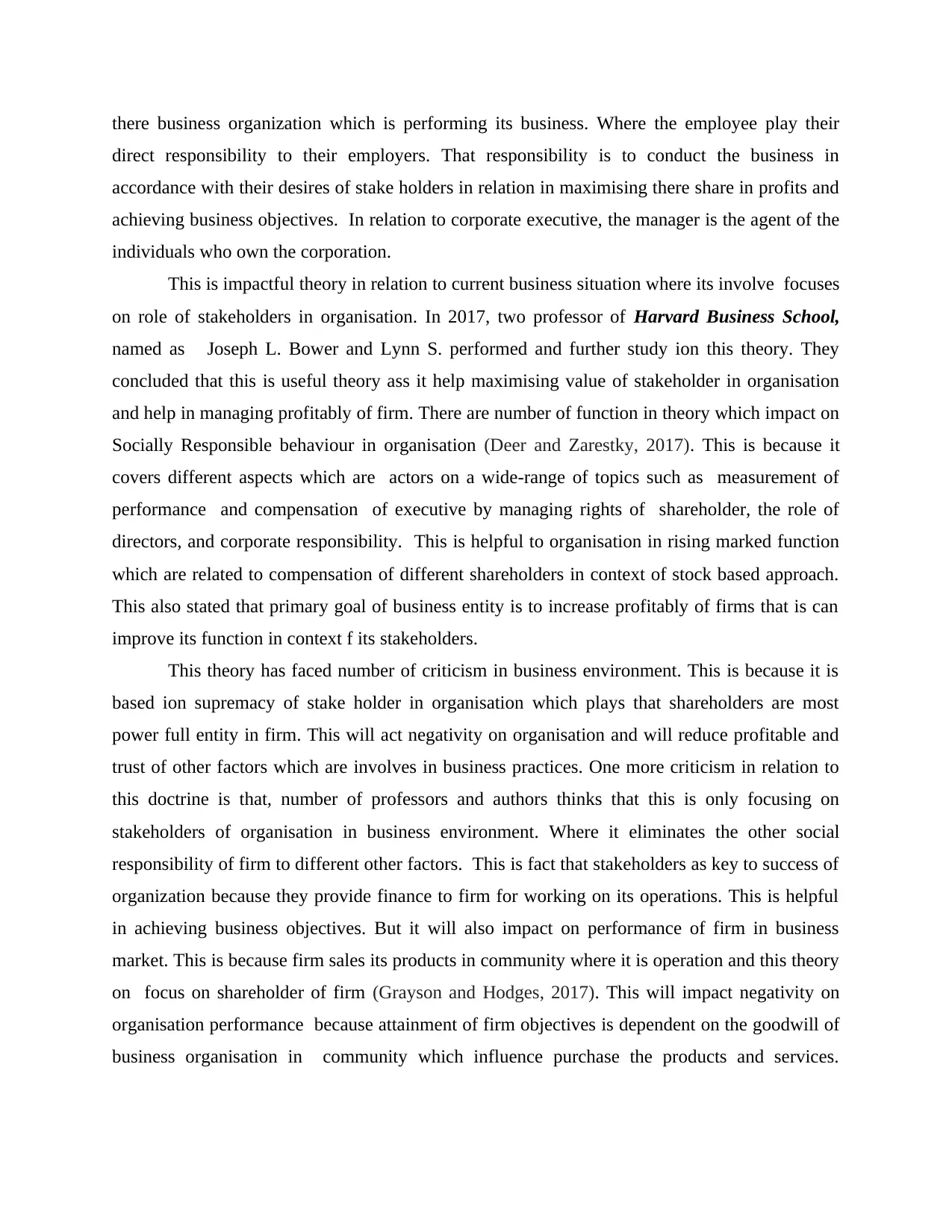
there business organization which is performing its business. Where the employee play their
direct responsibility to their employers. That responsibility is to conduct the business in
accordance with their desires of stake holders in relation in maximising there share in profits and
achieving business objectives. In relation to corporate executive, the manager is the agent of the
individuals who own the corporation.
This is impactful theory in relation to current business situation where its involve focuses
on role of stakeholders in organisation. In 2017, two professor of Harvard Business School,
named as Joseph L. Bower and Lynn S. performed and further study ion this theory. They
concluded that this is useful theory ass it help maximising value of stakeholder in organisation
and help in managing profitably of firm. There are number of function in theory which impact on
Socially Responsible behaviour in organisation (Deer and Zarestky, 2017). This is because it
covers different aspects which are actors on a wide-range of topics such as measurement of
performance and compensation of executive by managing rights of shareholder, the role of
directors, and corporate responsibility. This is helpful to organisation in rising marked function
which are related to compensation of different shareholders in context of stock based approach.
This also stated that primary goal of business entity is to increase profitably of firms that is can
improve its function in context f its stakeholders.
This theory has faced number of criticism in business environment. This is because it is
based ion supremacy of stake holder in organisation which plays that shareholders are most
power full entity in firm. This will act negativity on organisation and will reduce profitable and
trust of other factors which are involves in business practices. One more criticism in relation to
this doctrine is that, number of professors and authors thinks that this is only focusing on
stakeholders of organisation in business environment. Where it eliminates the other social
responsibility of firm to different other factors. This is fact that stakeholders as key to success of
organization because they provide finance to firm for working on its operations. This is helpful
in achieving business objectives. But it will also impact on performance of firm in business
market. This is because firm sales its products in community where it is operation and this theory
on focus on shareholder of firm (Grayson and Hodges, 2017). This will impact negativity on
organisation performance because attainment of firm objectives is dependent on the goodwill of
business organisation in community which influence purchase the products and services.
direct responsibility to their employers. That responsibility is to conduct the business in
accordance with their desires of stake holders in relation in maximising there share in profits and
achieving business objectives. In relation to corporate executive, the manager is the agent of the
individuals who own the corporation.
This is impactful theory in relation to current business situation where its involve focuses
on role of stakeholders in organisation. In 2017, two professor of Harvard Business School,
named as Joseph L. Bower and Lynn S. performed and further study ion this theory. They
concluded that this is useful theory ass it help maximising value of stakeholder in organisation
and help in managing profitably of firm. There are number of function in theory which impact on
Socially Responsible behaviour in organisation (Deer and Zarestky, 2017). This is because it
covers different aspects which are actors on a wide-range of topics such as measurement of
performance and compensation of executive by managing rights of shareholder, the role of
directors, and corporate responsibility. This is helpful to organisation in rising marked function
which are related to compensation of different shareholders in context of stock based approach.
This also stated that primary goal of business entity is to increase profitably of firms that is can
improve its function in context f its stakeholders.
This theory has faced number of criticism in business environment. This is because it is
based ion supremacy of stake holder in organisation which plays that shareholders are most
power full entity in firm. This will act negativity on organisation and will reduce profitable and
trust of other factors which are involves in business practices. One more criticism in relation to
this doctrine is that, number of professors and authors thinks that this is only focusing on
stakeholders of organisation in business environment. Where it eliminates the other social
responsibility of firm to different other factors. This is fact that stakeholders as key to success of
organization because they provide finance to firm for working on its operations. This is helpful
in achieving business objectives. But it will also impact on performance of firm in business
market. This is because firm sales its products in community where it is operation and this theory
on focus on shareholder of firm (Grayson and Hodges, 2017). This will impact negativity on
organisation performance because attainment of firm objectives is dependent on the goodwill of
business organisation in community which influence purchase the products and services.
Paraphrase This Document
Need a fresh take? Get an instant paraphrase of this document with our AI Paraphraser
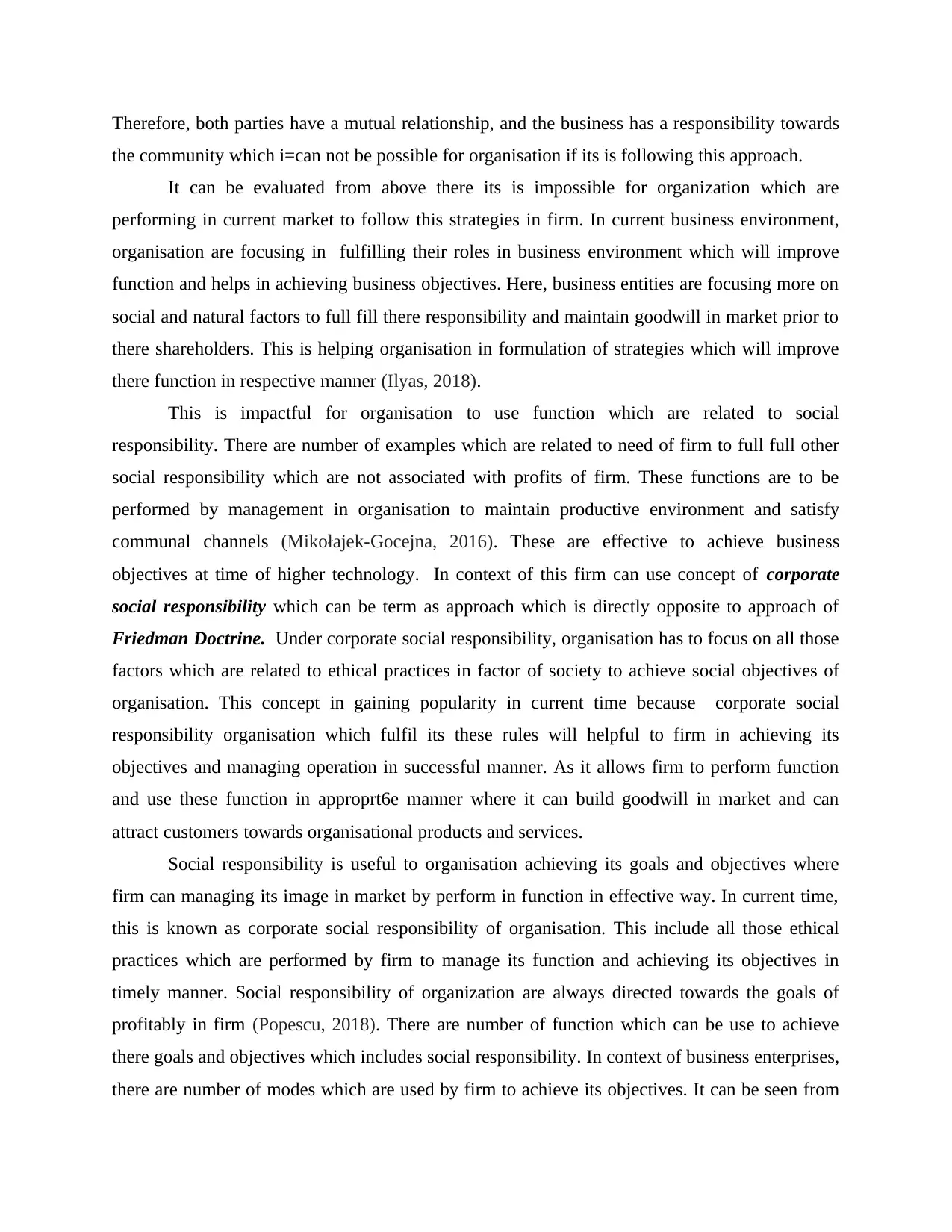
Therefore, both parties have a mutual relationship, and the business has a responsibility towards
the community which i=can not be possible for organisation if its is following this approach.
It can be evaluated from above there its is impossible for organization which are
performing in current market to follow this strategies in firm. In current business environment,
organisation are focusing in fulfilling their roles in business environment which will improve
function and helps in achieving business objectives. Here, business entities are focusing more on
social and natural factors to full fill there responsibility and maintain goodwill in market prior to
there shareholders. This is helping organisation in formulation of strategies which will improve
there function in respective manner (Ilyas, 2018).
This is impactful for organisation to use function which are related to social
responsibility. There are number of examples which are related to need of firm to full full other
social responsibility which are not associated with profits of firm. These functions are to be
performed by management in organisation to maintain productive environment and satisfy
communal channels (Mikołajek-Gocejna, 2016). These are effective to achieve business
objectives at time of higher technology. In context of this firm can use concept of corporate
social responsibility which can be term as approach which is directly opposite to approach of
Friedman Doctrine. Under corporate social responsibility, organisation has to focus on all those
factors which are related to ethical practices in factor of society to achieve social objectives of
organisation. This concept in gaining popularity in current time because corporate social
responsibility organisation which fulfil its these rules will helpful to firm in achieving its
objectives and managing operation in successful manner. As it allows firm to perform function
and use these function in approprt6e manner where it can build goodwill in market and can
attract customers towards organisational products and services.
Social responsibility is useful to organisation achieving its goals and objectives where
firm can managing its image in market by perform in function in effective way. In current time,
this is known as corporate social responsibility of organisation. This include all those ethical
practices which are performed by firm to manage its function and achieving its objectives in
timely manner. Social responsibility of organization are always directed towards the goals of
profitably in firm (Popescu, 2018). There are number of function which can be use to achieve
there goals and objectives which includes social responsibility. In context of business enterprises,
there are number of modes which are used by firm to achieve its objectives. It can be seen from
the community which i=can not be possible for organisation if its is following this approach.
It can be evaluated from above there its is impossible for organization which are
performing in current market to follow this strategies in firm. In current business environment,
organisation are focusing in fulfilling their roles in business environment which will improve
function and helps in achieving business objectives. Here, business entities are focusing more on
social and natural factors to full fill there responsibility and maintain goodwill in market prior to
there shareholders. This is helping organisation in formulation of strategies which will improve
there function in respective manner (Ilyas, 2018).
This is impactful for organisation to use function which are related to social
responsibility. There are number of examples which are related to need of firm to full full other
social responsibility which are not associated with profits of firm. These functions are to be
performed by management in organisation to maintain productive environment and satisfy
communal channels (Mikołajek-Gocejna, 2016). These are effective to achieve business
objectives at time of higher technology. In context of this firm can use concept of corporate
social responsibility which can be term as approach which is directly opposite to approach of
Friedman Doctrine. Under corporate social responsibility, organisation has to focus on all those
factors which are related to ethical practices in factor of society to achieve social objectives of
organisation. This concept in gaining popularity in current time because corporate social
responsibility organisation which fulfil its these rules will helpful to firm in achieving its
objectives and managing operation in successful manner. As it allows firm to perform function
and use these function in approprt6e manner where it can build goodwill in market and can
attract customers towards organisational products and services.
Social responsibility is useful to organisation achieving its goals and objectives where
firm can managing its image in market by perform in function in effective way. In current time,
this is known as corporate social responsibility of organisation. This include all those ethical
practices which are performed by firm to manage its function and achieving its objectives in
timely manner. Social responsibility of organization are always directed towards the goals of
profitably in firm (Popescu, 2018). There are number of function which can be use to achieve
there goals and objectives which includes social responsibility. In context of business enterprises,
there are number of modes which are used by firm to achieve its objectives. It can be seen from
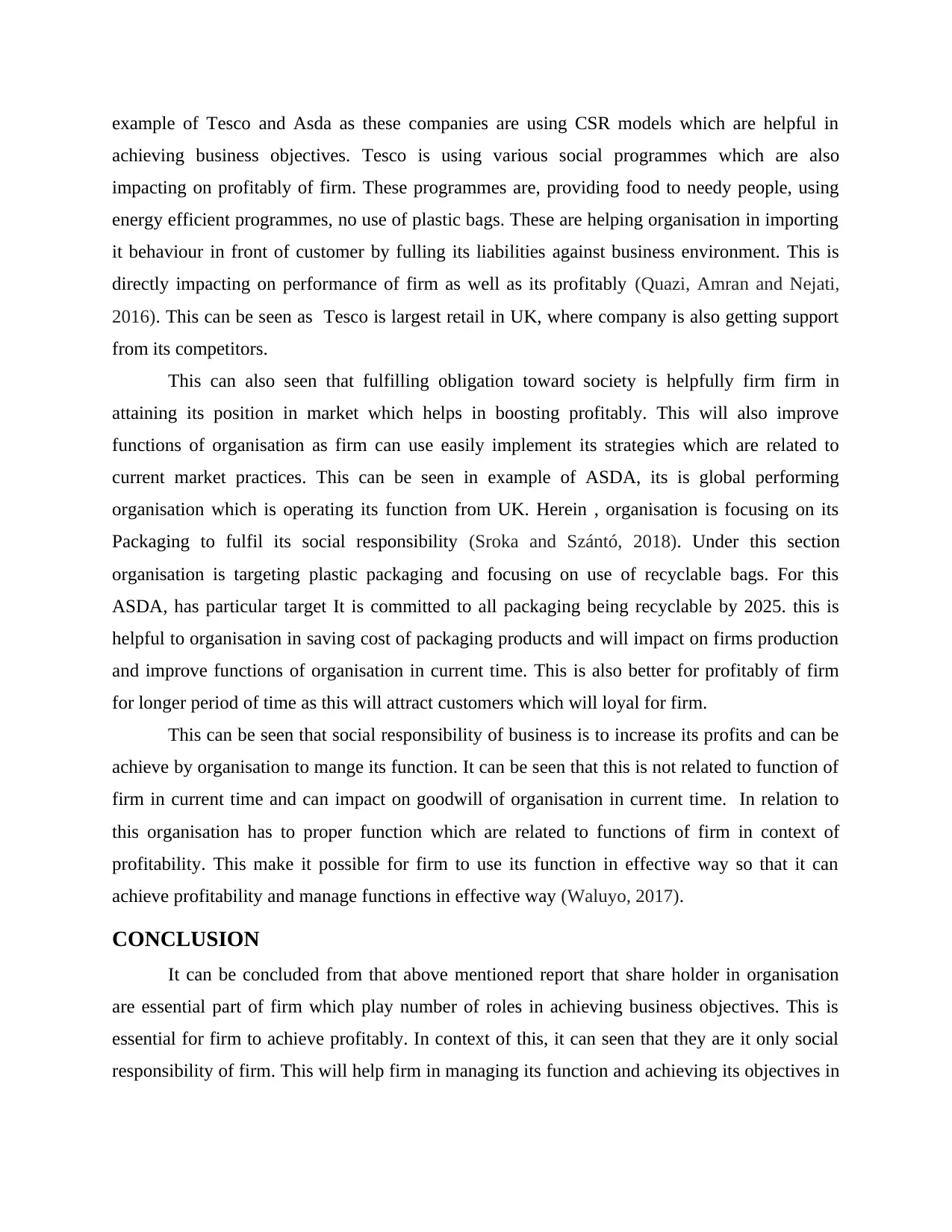
example of Tesco and Asda as these companies are using CSR models which are helpful in
achieving business objectives. Tesco is using various social programmes which are also
impacting on profitably of firm. These programmes are, providing food to needy people, using
energy efficient programmes, no use of plastic bags. These are helping organisation in importing
it behaviour in front of customer by fulling its liabilities against business environment. This is
directly impacting on performance of firm as well as its profitably (Quazi, Amran and Nejati,
2016). This can be seen as Tesco is largest retail in UK, where company is also getting support
from its competitors.
This can also seen that fulfilling obligation toward society is helpfully firm firm in
attaining its position in market which helps in boosting profitably. This will also improve
functions of organisation as firm can use easily implement its strategies which are related to
current market practices. This can be seen in example of ASDA, its is global performing
organisation which is operating its function from UK. Herein , organisation is focusing on its
Packaging to fulfil its social responsibility (Sroka and Szántó, 2018). Under this section
organisation is targeting plastic packaging and focusing on use of recyclable bags. For this
ASDA, has particular target It is committed to all packaging being recyclable by 2025. this is
helpful to organisation in saving cost of packaging products and will impact on firms production
and improve functions of organisation in current time. This is also better for profitably of firm
for longer period of time as this will attract customers which will loyal for firm.
This can be seen that social responsibility of business is to increase its profits and can be
achieve by organisation to mange its function. It can be seen that this is not related to function of
firm in current time and can impact on goodwill of organisation in current time. In relation to
this organisation has to proper function which are related to functions of firm in context of
profitability. This make it possible for firm to use its function in effective way so that it can
achieve profitability and manage functions in effective way (Waluyo, 2017).
CONCLUSION
It can be concluded from that above mentioned report that share holder in organisation
are essential part of firm which play number of roles in achieving business objectives. This is
essential for firm to achieve profitably. In context of this, it can seen that they are it only social
responsibility of firm. This will help firm in managing its function and achieving its objectives in
achieving business objectives. Tesco is using various social programmes which are also
impacting on profitably of firm. These programmes are, providing food to needy people, using
energy efficient programmes, no use of plastic bags. These are helping organisation in importing
it behaviour in front of customer by fulling its liabilities against business environment. This is
directly impacting on performance of firm as well as its profitably (Quazi, Amran and Nejati,
2016). This can be seen as Tesco is largest retail in UK, where company is also getting support
from its competitors.
This can also seen that fulfilling obligation toward society is helpfully firm firm in
attaining its position in market which helps in boosting profitably. This will also improve
functions of organisation as firm can use easily implement its strategies which are related to
current market practices. This can be seen in example of ASDA, its is global performing
organisation which is operating its function from UK. Herein , organisation is focusing on its
Packaging to fulfil its social responsibility (Sroka and Szántó, 2018). Under this section
organisation is targeting plastic packaging and focusing on use of recyclable bags. For this
ASDA, has particular target It is committed to all packaging being recyclable by 2025. this is
helpful to organisation in saving cost of packaging products and will impact on firms production
and improve functions of organisation in current time. This is also better for profitably of firm
for longer period of time as this will attract customers which will loyal for firm.
This can be seen that social responsibility of business is to increase its profits and can be
achieve by organisation to mange its function. It can be seen that this is not related to function of
firm in current time and can impact on goodwill of organisation in current time. In relation to
this organisation has to proper function which are related to functions of firm in context of
profitability. This make it possible for firm to use its function in effective way so that it can
achieve profitability and manage functions in effective way (Waluyo, 2017).
CONCLUSION
It can be concluded from that above mentioned report that share holder in organisation
are essential part of firm which play number of roles in achieving business objectives. This is
essential for firm to achieve profitably. In context of this, it can seen that they are it only social
responsibility of firm. This will help firm in managing its function and achieving its objectives in
⊘ This is a preview!⊘
Do you want full access?
Subscribe today to unlock all pages.

Trusted by 1+ million students worldwide

mean time. Along with this, it can also concluded that firm has to use all those function which is
related to achieving business objectives in current time.
related to achieving business objectives in current time.
Paraphrase This Document
Need a fresh take? Get an instant paraphrase of this document with our AI Paraphraser
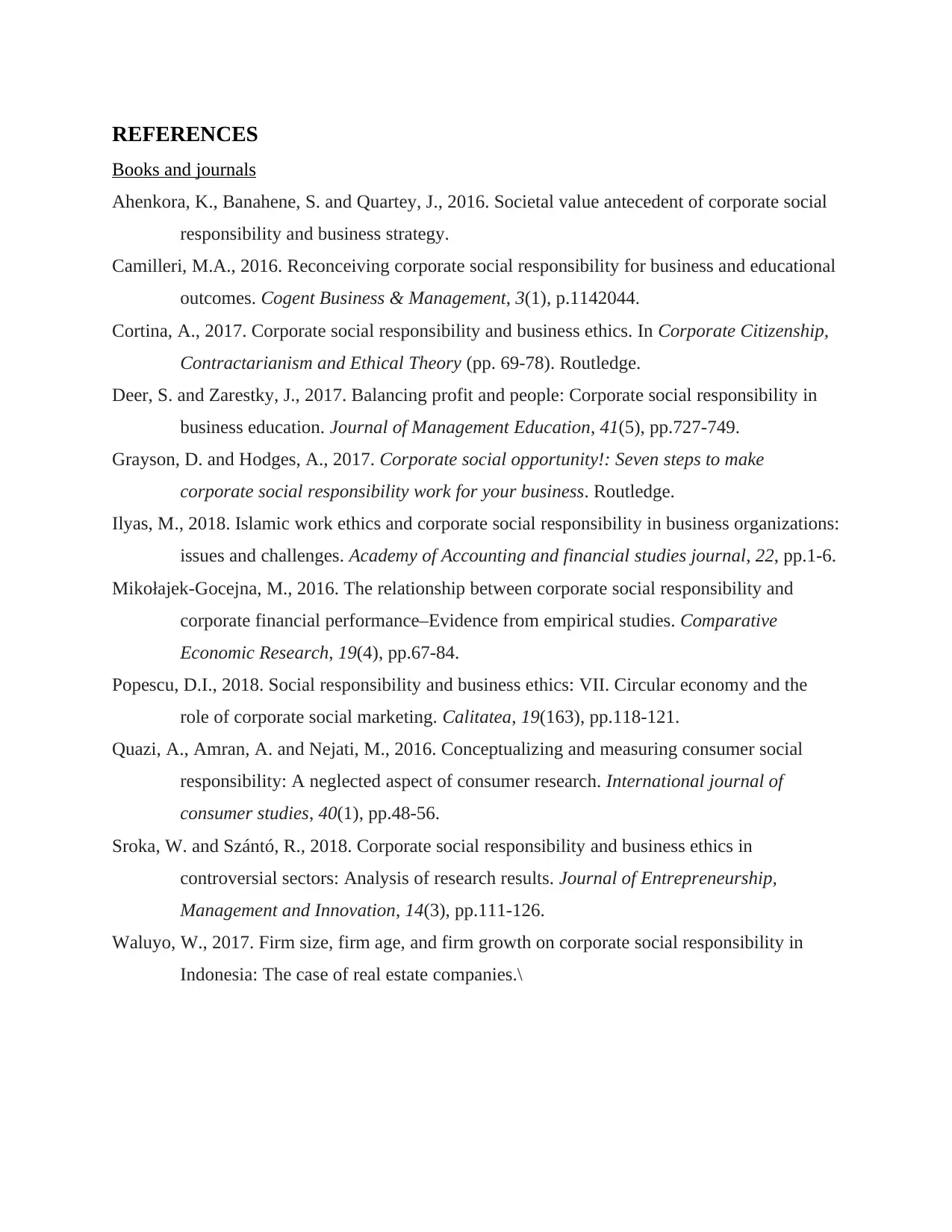
REFERENCES
Books and journals
Ahenkora, K., Banahene, S. and Quartey, J., 2016. Societal value antecedent of corporate social
responsibility and business strategy.
Camilleri, M.A., 2016. Reconceiving corporate social responsibility for business and educational
outcomes. Cogent Business & Management, 3(1), p.1142044.
Cortina, A., 2017. Corporate social responsibility and business ethics. In Corporate Citizenship,
Contractarianism and Ethical Theory (pp. 69-78). Routledge.
Deer, S. and Zarestky, J., 2017. Balancing profit and people: Corporate social responsibility in
business education. Journal of Management Education, 41(5), pp.727-749.
Grayson, D. and Hodges, A., 2017. Corporate social opportunity!: Seven steps to make
corporate social responsibility work for your business. Routledge.
Ilyas, M., 2018. Islamic work ethics and corporate social responsibility in business organizations:
issues and challenges. Academy of Accounting and financial studies journal, 22, pp.1-6.
Mikołajek-Gocejna, M., 2016. The relationship between corporate social responsibility and
corporate financial performance–Evidence from empirical studies. Comparative
Economic Research, 19(4), pp.67-84.
Popescu, D.I., 2018. Social responsibility and business ethics: VII. Circular economy and the
role of corporate social marketing. Calitatea, 19(163), pp.118-121.
Quazi, A., Amran, A. and Nejati, M., 2016. Conceptualizing and measuring consumer social
responsibility: A neglected aspect of consumer research. International journal of
consumer studies, 40(1), pp.48-56.
Sroka, W. and Szántó, R., 2018. Corporate social responsibility and business ethics in
controversial sectors: Analysis of research results. Journal of Entrepreneurship,
Management and Innovation, 14(3), pp.111-126.
Waluyo, W., 2017. Firm size, firm age, and firm growth on corporate social responsibility in
Indonesia: The case of real estate companies.\
Books and journals
Ahenkora, K., Banahene, S. and Quartey, J., 2016. Societal value antecedent of corporate social
responsibility and business strategy.
Camilleri, M.A., 2016. Reconceiving corporate social responsibility for business and educational
outcomes. Cogent Business & Management, 3(1), p.1142044.
Cortina, A., 2017. Corporate social responsibility and business ethics. In Corporate Citizenship,
Contractarianism and Ethical Theory (pp. 69-78). Routledge.
Deer, S. and Zarestky, J., 2017. Balancing profit and people: Corporate social responsibility in
business education. Journal of Management Education, 41(5), pp.727-749.
Grayson, D. and Hodges, A., 2017. Corporate social opportunity!: Seven steps to make
corporate social responsibility work for your business. Routledge.
Ilyas, M., 2018. Islamic work ethics and corporate social responsibility in business organizations:
issues and challenges. Academy of Accounting and financial studies journal, 22, pp.1-6.
Mikołajek-Gocejna, M., 2016. The relationship between corporate social responsibility and
corporate financial performance–Evidence from empirical studies. Comparative
Economic Research, 19(4), pp.67-84.
Popescu, D.I., 2018. Social responsibility and business ethics: VII. Circular economy and the
role of corporate social marketing. Calitatea, 19(163), pp.118-121.
Quazi, A., Amran, A. and Nejati, M., 2016. Conceptualizing and measuring consumer social
responsibility: A neglected aspect of consumer research. International journal of
consumer studies, 40(1), pp.48-56.
Sroka, W. and Szántó, R., 2018. Corporate social responsibility and business ethics in
controversial sectors: Analysis of research results. Journal of Entrepreneurship,
Management and Innovation, 14(3), pp.111-126.
Waluyo, W., 2017. Firm size, firm age, and firm growth on corporate social responsibility in
Indonesia: The case of real estate companies.\
1 out of 8
Related Documents
Your All-in-One AI-Powered Toolkit for Academic Success.
+13062052269
info@desklib.com
Available 24*7 on WhatsApp / Email
![[object Object]](/_next/static/media/star-bottom.7253800d.svg)
Unlock your academic potential
Copyright © 2020–2026 A2Z Services. All Rights Reserved. Developed and managed by ZUCOL.





